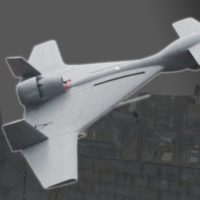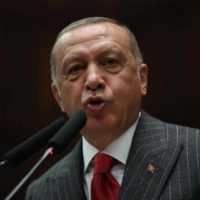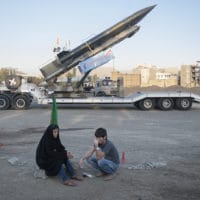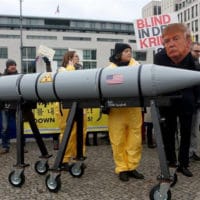-
How to commit war crimes—and get away with it
U.S. President Donald Trump sacked his Navy secretary on Twitter because he did not follow Trump’s advice and retain Navy Special Warfare Operator Edward Gallagher, despite Gallagher being accused of stabbing to death a wounded fighter, of murdering a schoolgirl and an elderly man, and then of obstructing justice.
-
The human cost of nuclear weapons is not only a “feminine” concern
The nuclear weapons world is full of subtle and not-so-subtle misogyny, and I’ve had my share of experiences: Fighting my way onto an otherwise all-male panel, only to have my speaking time cut short. Meeting a male colleague at a conference for the first time, where he immediately told me that he liked the red […]
-
How U.S. sanctions on Iran are killing innocent people
It is a measure of the fortitude of Iran that—despite these unilateral U.S. sanctions—it has been able to maintain production of medical equipment and drugs. Nonetheless, the Human Rights Watch report should be seen as an alarm.
-
Bedouin mass eviction – Israel to drive Palestinians off their historic lands
Last week 36,000 Bedouin–all of them Israeli citizens–discovered that their state is about to make them refugees in their own country, driving them into holding camps. These Israelis, it seems, are the wrong kind.
-
Top US Army official: Build AI weapons first, then design safety
“We need to decide if we want to live in a world in which autonomous weapons systems identify and attack targets faster than humans can think.”
-
Police killed CPN leader Paudel in cold blood: NHRC
The NHRC has recommended that the government should investigate officers issuing orders to police officials who acted against Paudel and bring them to book.
-
What to expect from Turkey’s coming invasion of Syria
Erdogan’s government is preparing to enter Syria for a major military operation against the Syrian Democratic Forces (SDF), which is made up largely of Kurdish factions who set up this armed force to defend the mainly Kurdish enclave in northern Syria.
-
How can Sweden be a peace broker for the war in Yemen if it’s also selling the arms that make it possible?
Sweden might have some credibility if it banned weapons sales to Saudi Arabia and the UAE. It is not enough to be moved by the tragedy in Yemen. Action is necessary.
-
Hungering for the language of class war
Dark skies persist over coastal Brazil, where the country’s major population centres are to be found. This year, there have been 40,341 fires in the Amazon, the highest since 2010.
-
Hybrid wars are destroying Democracies
In Brazil recently, I gave an interview to Brasil de Fato, which was born in 2003 as the weekly magazine of the World Social Forum. It is now one of the most important windows into Brazil’s political world. The newsletter this week carries the text of most of the interview.
-
Why the world is watching the fate of an Iranian tanker in the Mediterranean
The British, it is clear, seized the Iranian tanker at the urging of the United States. There was no previous British warning that it might enter in such a muscular way into the U.S. attempt to suffocate Iran.
-
Imagining a free Palestine should be commonplace—that’s why I wrote the novel ‘Siegebreakers’
The siege of Gaza is crushing the people who live under it, and it is crushing all of our imaginations.
-
Don’t believe the hype about the ‘rules-based order’, capitalism is perpetual war
Why is war, or the threat of it, a permanent feature of our society? The most common answers point to contingencies–the psychology of particular world leaders, for example, or the specific gains to a company to be made from a conflict. Alternatively, they rely on universal claims that religion causes eternal strife or that conflict is part of our human nature.
-
USA vs. Venezuela: the embargo as part of a war with no turning back (Interview – Julio Escalona)
The total embargo declared by Donald Trump against Venezuela is another step in sharpening his strategy to generate chaos in the country and overthrow Nicolás Maduro. Julio Escalona, deputy of the National Constituent Assembly, analyzes the situation, the possibility of dialogues, and challenges.
-
There must be bones under the paved street
On 6 August 1945, the United States military dropped a bomb that contained 64kg of uranium-235 over the city of Hiroshima (Japan). The bomb took just over 44 seconds to fall from 9,400 metres and detonated 580 metres above the Shima Surgical Clinic. Over 80,000 people died instantly. This was the first use of the nuclear bomb.
-
Are U.S. military planes announcing formal aggression against Venezuela?
In less than a month, U.S. air raids into our Maiquetía Flight Information Region (FIR) have multiplied, following a pattern that is admittedly very worrisome. The routes described by its EP-3 Ares II aircraft are revealing, taking into account the nature of this type of aircraft.
-
Iran simply won’t let itself be hemmed in by the U.S. and UK
The United States is leading a process to create a naval force that would patrol the Strait of Hormuz. The U.S. has said it will send “command and control” ships to coordinate the escort naval vessels from different countries. But there are cracks in the coalition.
-
Venezuela recovers from blackout as Guaido ‘approves’ military treaty reincorporation
Caracas blamed the blackout on an “electromagnetic attack” while recovery was faster than before.
-
The U.S.-Iran standoff can only end when the U.S. accepts Iran’s right to have a nuclear energy program
The U.S. objection to Iran is not based on international law, but merely based on its political objectives. This is clearly illustrated by open U.S. support for nuclear energy and nuclear weapon development in India; and nuclear weapon stockpiling in Israel, which the U.S. has always fully backed.
-
U.S. economic warfare and likely foreign defenses
Keynote Paper delivered at the 14th Forum of the World Association for Political Economy, July 21, 2019. Today’s world is at war on many fronts. The rules of international law and order put in place toward the end of World War II are being broken by U.S. foreign policy escalating its confrontation with countries that […]




















